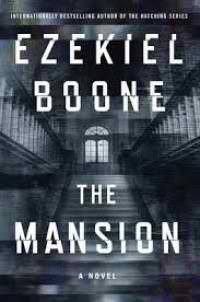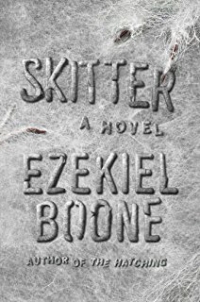The Mansion by Ezekiel Boone
 Friday, December 7, 2018 at 7:06AM
Friday, December 7, 2018 at 7:06AM 
Published by Atria/Emily Bestler Books on December 4, 2018
The Mansion is a horror novel that faintly echoes The Shining, in that the action takes place in an older multiple-room building occupied in its winter months by a husband and wife that, come spring, will be placed in the service of guests. The story is also similar in that the protagonist struggles with his sanity — perhaps he was a bit unhinged before beginning his stay; perhaps his perceptions are altered by the environment in which he dwells. In most respects, however, The Mansion and The Shining are quite different.
Billy Stafford and Shawn Eagle developed a new kind of smartphone operating system by working intensely in a cabin near a dilapidated mansion in the woods for 23 months. A third fellow who joined them, Takata, they try not to think about. Billy didn’t think about much of anything except drugs and booze after Shawn stole the company from him. Billy won Emily, the woman they both wanted, but Shawn became one of the richest men in the world, leaving Billy with a small amount of stock that he sold to support his addictions.
Years earlier, Shawn’s parents died in a fire on the property where the mansion sat. It has always had a reputation for being haunted. Shawn is rennovating to create a retreat for the ultra-wealthy, but construction accidents have only added to the legend of the haunted mansion.
Shawn has equipped the mansion with a program called Nellie that he and Billy imagined but never made a reality. Billy wrote most of the code; Shawn’s engineers tried to plug the gaps. Nellie is not quite an Artificial Intelligence, but it is meant to anticipate needs and to take action, without being prompted, to make its users happy. Shawn wants Nellie to run the mansion but there’s a ghost in the machine and Shawn needs Billy to perform an exorcism. Nellie, it seems, has a temper.
The final plot element involves Emily’s sister Beth, her husband Rothko, and their spooky twin daughters. That’s the only plot element that didn’t work for me. At some point, enough is enough and more is too much. The twins play a significant role in the story but they don’t fit snugly into the concept and their presence is just too convenient. Eziekiel Boone could have told the story without them and their omission would have improved the novel’s focus. The science fiction rule that it's fine to imagine one, but only one, impossible thing should also bind horror writers.
Despite my sense that The Mansion is an inspired amalgamation of two or three Stephen King plots, it stands comfortably on its own merits. Horror succeeds when it’s convincing. Apart from the bewitched twins, Boone does a masterful job of placing real people in real danger. Even if the danger is combination of supernatural forces and a computer gone mad, Boone does what good horror writers do — he makes the reader forget how divorced from reality the story’s premise might be so that the reader can worry about Billy and Emily and experience vicarious fear. The novel has a good pace, develops sympathetic characters in a reasonable amount of detail, and works its way to a satisfying climax.
RECOMMENDED
